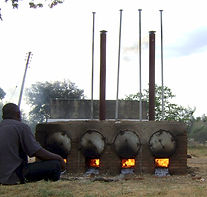
SESCOM LTD
Biomass Energy Services
Biomass is organic material of biological origin constituting a renewable energy source such as energy derived from plants and animals. Biomass exists in three forms:- liquid, gaseous and solid. Liquid biomass covers waste oil, straight vegetable oil, biodiesel and bioethanol. Gaseous biomass includes biogas, landfill gas and producer gas. Solid biomass covers firewood and charcoal, agricultural residues and animal waste.
Tanzania has considerable sources of biomass including agricultural and forest bio-residues which in combination with the woodlands, meet the majority of household energy needs. Biomass is by far the most important source of energy in Tanzania accounting for about 90 percent of the total energy consumption.
Modern use of biomass entails generation of electricity through biochemical and thermochemical technologies. So far a number of sugar factories and wood industries are employing co-generation (combined heat and power) to produce electricity for own use and export excess to the national grid.
Biogas has potential of being used as fuel in combustion engines, which convert it to mechanical energy, powering an electric generator to produce electricity. Only few of the plants installed in Tanzania are destined for electricity production. Power generation from biogas has become the focus of support of development partners in recent years in Tanzania. There are some inconsistent efforts from different organisations of generating electricity from agricultural wastes such as sisal wastes and rice husks. The initial efforts for electricity generation from biomass should be further promoted as a new and diversified electricity sources.
Gaseous biomass from bio-wastes which include: animals, agricultural residues and municipal wastes have potential to contribute to provision of energy services. Tanzania is estimated to have 44 million livestock potential for providing feedstock for biogas and other bio-products. Conversion of the bio-wastes into gaseous biomass, if efficiently exploited, can enhance availability of energy for cooking; lighting and other energy uses while mitigating waste management problems, environmental conservation and production of manure for agricultural use.
Wider dissemination of the biogas technology has not been adequately implemented due to high initial costs and lack of awareness in the communities. There have been no development of biogas standalone generation of electricity which could spark development in the areas that are not connected the national grid network. n the long run for schemes to be feasible


